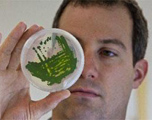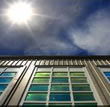



At 5'8" tall, Karen Paris doesn't need to wear high-heeled shoes. She just likes high heels — tall ones, as in 3" to 4". But after nearly falling a couple times, Paris, a trainer for the Berkeley Lab Learning Institute (BLI), decided that safety trumps vanity, and about a year ago switched to wearing sneakers whenever she needs to walk around the Lab. "I want to be safe," she says. "There are lots of dips and dives here. I've slipped many times, especially going down the stairs; plus, leaves and acorns fall on the stairs." Now she feels much more comfortable and safe walking in her sneakers. Still, she admits to changing into her heels as soon as she's in the office or a class. "It's a vanity thing, what can I say," she says with a laugh.
 [Mercury News] Bolstered by a federal mandate to produce 36 billion gallons annually by 2022, researchers who've endured the highs and lows of the field are optimistic that this time, biofuels are going mainstream. "It's just a matter of more time, but this will go ahead," said Berkeley Lab physical bioscientist Harvey Blanch, chief science and technology officer with the Joint BioEnergy Institute, a new Berkeley Lab biofuels lab backed by a $125 million federal grant to develop commercially viable alternates to corn ethanol within five years. More>
[Mercury News] Bolstered by a federal mandate to produce 36 billion gallons annually by 2022, researchers who've endured the highs and lows of the field are optimistic that this time, biofuels are going mainstream. "It's just a matter of more time, but this will go ahead," said Berkeley Lab physical bioscientist Harvey Blanch, chief science and technology officer with the Joint BioEnergy Institute, a new Berkeley Lab biofuels lab backed by a $125 million federal grant to develop commercially viable alternates to corn ethanol within five years. More>
The Union of Professional and Technical Employees (UPTE) has announced a one-day strike of the Berkeley campus and UC headquarters tomorrow. As a precautionary measure, gate access to the Lab will be altered. Strawberry Gate will be open only to neutral contractors and subcontractors, including their employees, visitors and vendors. Grizzly Peak and Blackberry Gates are only for the use of Lab and UC employees, visitors, guests, and vendors/suppliers. Grizzly Peak gate is open for entry until 10:30 a.m. Staff who try to enter Strawberry Gate will be turned away and directed to the other gates.
Global climate change is hotly debated, to say the least. But two experts — including Berkeley Lab's Michael Wehner — warn that using short-term trends that show little temperature change (or even slight cooling) to refute global warming is misleading. The long-term pattern clearly shows human activities are causing the earth's climate to heat up. More>
 Special Event: Hot Technology, Cool Science at Next 'Theater' Event
Special Event: Hot Technology, Cool Science at Next 'Theater' Event The Lab's next "Science at the Theater" will feature short presentations by several Lab scientists followed by a roundtable conversation moderated by KTVU's Jon Fowler. The scientists and the titles of their talks are: Hashem Akbari, Cool Your Roof, Cool the World; Nitash Balsara, Battery-Powered Commute; Todd DeSantis, Pocket-sized DNA Probe for Health and the Environment (pictured); Carl Haber, Preserving History, One Recording at a Time; and Katherine Yelick, Supercomputers for a Greener World. The event will take place Monday, May 11, at 7 p.m. at the Berkeley Repertory Theatre. More>
 Year of Science: Sustainability and the Environment Celebrated in This Month
Year of Science: Sustainability and the Environment Celebrated in This Month At Berkeley Lab, sustainability and environmental research means tackling problems that affect our planet — and our lives — through innovative team science. It started in the 1970s, when the Lab began to pioneer energy efficiency technologies that have wrung a fortune in savings from our homes and industry. Now, in addition to world-renowned energy efficiency research, interdisciplinary teams of Lab scientists are learning how to preserve our environment for future generations. More>
Today at Berkeley Lab is produced by Public Affairs' Communications Department